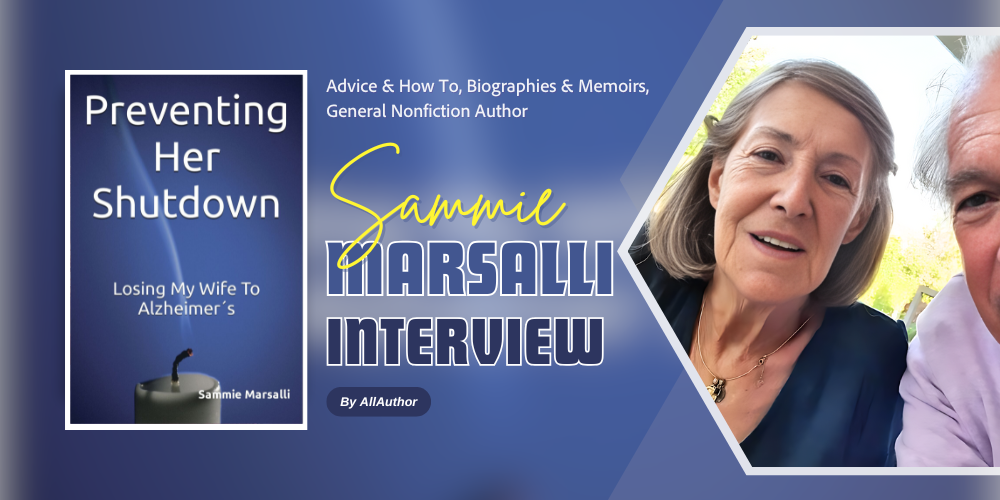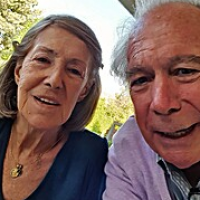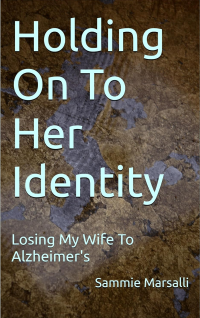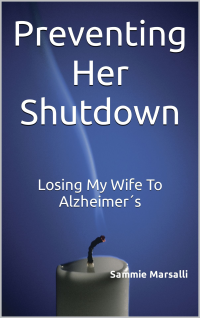Genre:
Advice & How To Biographies & Memoirs General Nonfiction- Country: United States
- Books: 3
- Profession: Teacher
- Born: 12 August
- Member Since: Jul 2022
- Profile Views: 10,789
- Followers: 183
“The author is a devoted Alzheimer's husband caregiver for his wife with Alzheimer’s, sharing personal experiences to support and empower fellow caregivers navigating the challenges of caring for a loved one. He provides a candid, heartfelt look into the unpredictable journey of Alzheimer's care, offering guidance, encouragement, and a sense of solidarity for those facing similar struggles. He hopes to help others mitigate frustration and find strength in their caregiving roles.”
My New Role
When my wife was diagnosed with Alzheimer’s, my world was turned upside down. I was no longer just her husband—I became her full-time caregiver, companion, and protector. What I didn’t realize then was that caregiving isn’t just about performing daily tasks. It’s about carrying an emotional burden that grows heavier with each passing day.
Unforeseen “highs and lows” of my journey are shared. My mission is to offer support, and empower our readers with prevention strategies and caregiving tips.
Home care without outside help is difficult, but usually, there is no other option. When behavioral changes and emergency events happen, professional help cannot respond in “real time.” Only home caregivers can at that very moment, with their only tool, “intuition.”
No Family Is Prepared For Alzheimer’s
No family is ever truly prepared for Alzheimer’s. There are no classes, no teachers, and no universal manual to follow. This disease is unpredictable, and each person’s journey is unique. What works one day may not work the next. What comforts today may cause distress tomorrow. I had to learn by trial and error, one painful lesson at a time.
As an author, I am certainly not an expert or an authority on Alzheimer's. I am definitely not a professional author and didn't pretend to write an authoritative masterpiece. I never pretended to be any one of those things. I am simply an ordinary “John Doe,” a 24/7 Alzheimer's caregiver husband, sharing my experiences and reactions and inventing therapies while caring for my wife at home with Alzheimer's. We have been married 44 years, have 3 kids now grown up, had a great dog most of those years, and are a typical family on our own, trying to hold on to my wife and avoid her shutdown.
Without me realizing it, hospice home care for my wife with Alzheimer's began on the very first day it was diagnosed.
This home care without any outside help is extremely difficult, but usually, there is no other option. Outside professional help cannot respond “in real time” when unforeseen events occur. Only home caregivers can do it at that very moment. No one has the exact key as to how to respond to these changes, as there are no two profile behavioral changes alike in the same stage of the disease.
There isn't a set therapy, as each stage of Alzheimer's varies in its characteristics. Only our experiences can be our guide. “What works for me may not work for you.”
As a result, I began to invent my own home activities and therapies. Family home caregivers find themselves alone, inventing their own home care to mitigate behavioral changes and needs.
I realize there are other Alzheimer’s home caregivers like me, “amateur,” trying to take care of a loved one with Alzheimer's. Like everyone, I was learning the hard way by trial and error to mitigate tremendous changes in behavior with my wife when they were happening.
As Alzheimer's home caregivers, we will sacrifice whatever it takes, suspend any activity we enjoy, ignore our necessities, and neglect our health to prevent our loved ones from “shutting down.” Whether we can see it or not, we know, in their own way, our loved ones are just trying to live.
Hopefully, my books become a shortcut for Alzheimer’s caregivers, to avoid some of the desperation, frustration, and sadness on their tortuous caregiving journey.
You are invited to discover what caregiving for a loved one truly involves and recognize the incredible power of love that enables us to do things we never thought possible.
Sammie Marsalli's Books
Stay in the loop on books by Sammie Marsalli. See upcoming and best-selling books by the author here. You'll also find the deals on books by Sammie Marsalli.
** Please note that the information or price displayed here may not be the updated. Make sure to double-check the latest book price before buying books.
** Also, there might be other books by Sammie Marsalli not listed on AllAuthor.
| Book |
|---|
Holding On To Her Identity: Losing My Wife To Alzheimer'sby Sammie MarsalliPublish: Sep 28, 2024Series: Preventing Her Shutdown From Alzheimer'sAdvice & How To Biographies & Memoirs General Nonfiction |
Preventing Her Shutdown: Losing My Wife To Alzheimer'sby Sammie MarsalliPublish: Jun 15, 2022Series: Preventing Her Shutdown From Alzheimer'sAdvice & How To Biographies & Memoirs General Nonfiction |
62 Tips For Caregivers Of Alzheimer's To Delay Shutdownby Sammie MarsalliPublish: May 23, 2023Series: Preventing Her Shutdown From Alzheimer'sAdvice & How To Biographies & Memoirs General Nonfiction |
Sammie Marsalli Interview On 21, Apr 2025
 "Sammie Marsalli is a devoted Alzheimer's home caregiver, sharing personal experiences to support and empower fellow caregivers navigating the challenges of caring for a loved one. His books provide a candid, heartfelt look into the unpredictable journey of Alzheimer's care, offering guidance, encouragement, and a sense of solidarity for those facing similar struggles. Through his writing, he hopes to help others mitigate frustration and find strength in their caregiving roles."
"Sammie Marsalli is a devoted Alzheimer's home caregiver, sharing personal experiences to support and empower fellow caregivers navigating the challenges of caring for a loved one. His books provide a candid, heartfelt look into the unpredictable journey of Alzheimer's care, offering guidance, encouragement, and a sense of solidarity for those facing similar struggles. Through his writing, he hopes to help others mitigate frustration and find strength in their caregiving roles."
With the advancement of each new stage of this disease, my learning experiences as my wife's caregiver in how to respond to behavior changes are documented in each book.
What inspired you to continue documenting your journey in additional books?Many articles have been written about Alzheimer's disease and its symptoms, but little has been written about how to care for a loved one in the home from the perspective of a home caregiver with no experience or guidance. I was aware that it was important to note my experiences in real-time, knowing that I would not be able to remember them through my emotions as time went on. I continued to document my successes and failures in defending my wife to share with other home caregivers who might be new to this journey.
Looking back at your first book, is there anything you would approach differently now?No, because taking notes in real-time during the same day when events occurred allowed me to go into detail, details I am certain would be difficult to remember as time went on. I realized that in this way, I could help other home caregivers who were as unprepared as I was.
Can you describe an unexpected challenge you’ve faced in recent years and how you handled it?My wife couldn’t speak, so I never knew how she felt or if she was sick. She was diagnosed with three UTI infections within three months, and she was hospitalized each time. During her first infection, she fainted suddenly and became unconscious while we were sitting at the kitchen table. I called an ambulance, and the paramedics revived her before taking her to the emergency room. She slowly recovered.
Before going to bed, I always checked up on her to see if she was sleeping. I heard her breathing with an unusual sound coming from her chest. My son and I rushed her to the hospital, and it was confirmed that she needed oxygen due to COVID-19. She was diagnosed with pneumonia and was hospitalized. I stayed beside her 24/7, as I slept on a couch in her room. I also caught COVID-19, but I didn't seem to care. I couldn’t leave her alone. I wasn’t sure if this was the "beginning of the end." We both slowly recovered.
You talk about “unknown and profound emotions” in caregiving—how has your emotional journey changed since your first book?Every night I prayed, “Please God, don’t take me before her, and when you do take her, take me the next day.”
If we had a good day, I always asked Him, “Please, just one more day like today.” I was always afraid of “tomorrow.” Every night, after tucking her in bed and saying “goodnight” to her, it felt like I was saying “goodbye.”
What has been the most meaningful feedback you’ve received from readers for your book, “Holding On To Her Identity”?This Review posted on Amazon made a meaningful impact on my writing. “Sammie Marsalli offers a heartfelt and deeply personal account of his journey as a full-time caregiver for his wife, battling the devastating effects of Alzheimer’s. Driven by a profound love and determination to preserve her sense of identity, Marsalli shares practical strategies he developed to maintain her connection to herself and their family amidst the challenges of the disease. His candid reactions reveal a tireless commitment to protecting her dignity, even in the face of uncertainty. Marsalli emerges as a compassionate advocate for Alzheimer’s caregivers, emphasizing the irreplaceable role they play in real-time care and emotional support. His approach to counseling is rooted in empathy, creativity, and adaptability, focusing on practical problem-solving rather than one-size-fits-all solutions. His priorities lie in fostering connection, mitigating distressing symptoms like “blank-stare moments,” and honoring the humanity of both the patient and the caregiver. This book is not only a testament to the resilience of the human spirit but also an invaluable resource for caregivers seeking guidance in preserving identity and maintaining meaningful interactions. Marsalli’s narrative underscores the transformative power of love, patience, and unwavering commitment in the face of one of life’s most profound challenges. Based on its rich emotional depth, practical value, and advocacy for Alzheimer’s caregivers, "Holding On To Her Identity: Losing My Wife to Alzheimer’s" deserves a solid 5 out of 5 stars. Sammie Marsalli's compassionate and creative approach, coupled with his profound dedication, makes this book both an inspiring read and a vital guide for those facing similar challenges. What’s most important to know about Sammie Marsalli’s book, Holding On To Her Identity: Losing My Wife to Alzheimer’s, is its dual focus on emotional connection and practical caregiving strategies. Here are the key takeaways: Core Message: The book emphasizes the importance of preserving the identity and dignity of individuals living with Alzheimer’s, even as the disease progresses. Practical Strategies: Marsalli shares creative, adaptable caregiving methods that focus on fostering connection and reducing distress for both the caregiver and the person with Alzheimer’s. Empathy and Advocacy: His narrative highlights the irreplaceable role of caregivers, advocating for their emotional well-being and providing insight into how to navigate the challenges of caregiving with resilience and love. Emotional Depth: Marsalli’s deeply personal account inspires and comforts caregivers by showing how patience, love, and commitment can make a meaningful difference in an otherwise difficult journey. Audience: This book serves as both a source of guidance for caregivers and a testament to the power of human connection, making it valuable for anyone touched by Alzheimer’s, whether directly or indirectly. If you're looking for an empathetic, practical, and inspiring resource on Alzheimer's caregiving, this book offers a wealth of wisdom.”
Your books serve as a guide for others—do you see them as a form of legacy for fellow caregivers?No, every caregiver’s journey is different. Alzheimer’s victims respond differently to the same stage of this disease. Each caregiver develops an independent path to manage these behavior changes. My guide is only one path, but no path is “set in stone.” Rather, we share experiences from each other's journey, as there is always something new we can borrow from each other to help us in our caregiving.
If you could share one essential piece of advice with new Alzheimer’s caregivers, what would it be?Try to get inside the “dementia bubble” of their loved one. Remember that what is logical to you is not necessarily logical to them. Avoid arguing and anger. Frustration can come easily. A lot of patience is needed. Exercise and constant interaction are critical. When it is possible, feed self-esteem with praise. Show your love even with the simplest gestures.
One of the biggest fears you mention is losing connection with your wife. What methods have worked best for maintaining that bond?Talking Connects I am constantly talking to her even though she doesn't speak. She must always hear my voice. She will look at me, a look I know when she understands, or she will smile. We are connecting. Sometimes she will repeat one of my words. We are connecting. She must never forget my voice. Walks Connect Our daily walks are so important because they enable us to connect more than any other time of the day. I will ask her to take my arm and walk beside me, and she does. I am always talking to her as we walk to the plaza. Praising Connects Self-Esteem became vital and key to combat any possibility of depression. It was so important to me for my wife to feel happy about herself and consequently joy with life. I was always congratulating her and praising her for something. Touching Connects Touching is key in transmitting a connection. Her holding my arm or hand, or me patting her on the back or shoulder, is connecting and transmitting affection. Sometimes I extend my hand to make it available and she will grab and hold it. Embracing is connecting. Basic Tasks Connect I constantly try to ask her to do something, and she always does, following through with simple basic tasks. She will do everything I ask her to do in her silence. We are connecting. I attempt to discover what she can do and what may interest her, and I get her to participate in simple domestic tasks. Humor Connects Humor is very important throughout the day. I try to make simple jokes to get her to smile or laugh. She laughs at herself when I highlight something funny she did. We are connecting. Exercising Connects In the plaza, we play handball at a short distance, as she truly enjoys hitting the ball back and forth to me. Her reflexes are great. She immediately starts smiling as we play. We are connecting.
Now that you have written Holding On To Her Identity”, do you feel that sharing your story has helped you process your own experience?When I was writing, I was reliving the many emotional pains with the complicated situations that I was faced with, which made it difficult for me to continue on.
Now that I have published this book, it has been comforting to know that I am able to share my journey, hopefully to help other caregivers with a “shortcut” to avoid some of their emotional suffering.
Did you ever feel like you were losing your own sense of self in the process of trying to hold on to hers?I wasn't sure how my wife saw me. She was starting to see me as the father of her children, but did she see me as her husband? I never asked her or said, “I am your husband, or you are my wife.” I never went that far,ever. I decided to simply “pretend” she understood our relationship. I think I was so scared of that question and what would happen if she didn't know. I probably would be devastated, so I ignored the issue and just acted normally. Her interaction with me, including her holding my hand during our walks, arranging my collar in the elevator, kissing frequently, and looking for me in the house to accompany her, was "enough for me."
The question, “Who is your husband?” or teaching her who I was, was not necessary as long as we were always interacting with each other. I only had her facial expressions and gestures to measure her reactions, as she was unable to speak. I was constantly trying to read her eyes. Fortunately, I was always able to feel her affectionate interaction, which allowed me to just act normally as her husband.
Then I realized, “What about us?” Our 44 years of marriage, does she remember that past? She recognizes and knows me well, but how far back? Did our marriage begin in 1979 or 2017 when she was diagnosed? I was unsure where I was in her memory or how she saw me as her friend, husband, or third-party caregiver. I felt that I had to make sure she realized I was at least her “best friend” and cared for her. I wasn’t sure how she identied me. It really didn't matter to me what “my label” was to her, as long as she interacted with me as always and felt she could always depend on me. I knew that I had to earn her feelings of dependence on me and somehow realize she was my wife without dictating, “I am your husband, you are my wife.” These are phrases not to be memorized. That would never work.
What did you learn about non-verbal communication, and how did you and your wife continue to connect even when words failed?Reading Her Eyes Since my wife is unable to speak, I can only try to read her eyes and try to detect her emotions. Her eyes do indeed speak. I often see stress and frustration when she is trying to say something and answer me when she can't, as she understands 99.9% of every conversation. At that moment, I respond according to my perception as I give her the answer she might be trying to say. I am guessing, but it is imperative to avoid stress and provide comfort with a positive tone. Her eyes often speak with a blank stare, a complete disconnect from us and her surroundings. Often there is an “I don't know look” and a “yes, I know look.” I have learned to read her eyes to give me clues about what she is thinking and what she wants to say. I am, undoubtedly, relying on my intuition and perception to respond. Her eyes never speak anger or sadness. On rare occasions, she expresses happiness with a very brief smile. It's her eyes that keep us “speaking” to each other, and I can see and feel her eyes trying to talk to mine. I sometimes see frustration when she is trying to do something, and she is unable to do so. Reading her eyes for expression is all I've got, and this can be tough emotionally for any caregiver husband like me. My greatest frustration is her eyes that never say, “I don’t feel well,” or “I am in pain.” Speaking With Affection She speaks with affectionate gestures, which are the most important for me. She will unexpectedly grab my hand and hold on at any time of the day, when we take our walks, having lunch at the kitchen table, or at night when I tuck her in bed. Furthermore, she doesn't want to let go. Even when I bawl her out for something out of my frustration, she will grab my neck and hug me as if to say, “I know, you are right.” She kisses and hugs me at the slightest gesture on my part, to which I am always ready to respond in kind. This is the one moment I know how she feels, and I am thrilled because it means she is speaking and “connecting” with me. Speaking With A Smile When I see her smile, this means she is happy, so I am constantly searching for ways to provoke this expression of happiness. I did nd a guaranteed smile. When we leave the beauty shop every Thursday, walking down the street back to our car, I sing to her with a loud chant, “How beautiful you look,” and she repeats my words, imitating my chant and laughing. At the street corner, waiting for the stoplight to change, she grabs me with a hug and a kiss.
After so many years as a caregiver, what advice would you give to your past self when you were just starting this journey?I regret that I started this journey without getting any information. I was responding to every behavioral change “on the fly” only with my intuition and logic. I later realized that information was the best defense from the very beginning to learn what may lie ahead and how I may react.
Do you plan to write another book, and if so, what would you focus on next?Yes, I am currently in the process of writing another book focusing on my caregiving challenges with other aspects of this disease.
In what ways do you think AllAuthor and it's services have helped you in your writing journey?AllAuthor has been at the forefront of and key to exposing each of my three books to the public. I am grateful to them for providing independent authors with exclusive opportunities to showcase their work.
Ask Sammie Marsalli a Question
Have brimming questions to ask author Sammie Marsalli? Ask whatever you like, but keep it appropriate.
** Please note that unanswered questions will not appear on the page. Refrain from posting promotional messages.
Contact Sammie Marsalli
The author, a good book and you! Contact Sammie Marsalli here.
** Please refrain from spamming and don’t bombard the author with promotional mails/messages. Your IP/Email address may be blocked if found doing so.
Contact Author on:




